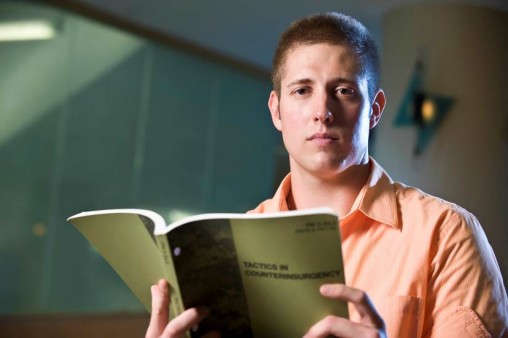
Wright State student and Army sergeant Ben McCullough hopes to turn an M.A. in international and comparative politics into a job with the Pentagon or a U.S. intelligence agency.
Ask Ben McCullough anything about the Civil War.
“You could hear the cannons at the Battle of Gettysburg in Washington, D.C.,” says McCullough. “It just happened to be the right weather conditions for the sound to travel that far.”
Military history is this Wright State University student’s passion and strong suit, but so is the military’s future. He hopes to turn a master’s degree in international and comparative politics into a job with the Pentagon or a U.S. intelligence agency, specializing in the Middle East or southwestern Asia.
McCullough grew up in the small farming community of Edon just west of Toledo, where “everyone knows everyone.” And he graduated from Edon High School, where he was class president and president of the National Honor Society.
While working on his bachelor’s degree in political science with a minor in history at Wittenberg University, McCullough did two internships at the Defense Institute of Security Assistance Management (DISAM).
Located on Wright-Patterson Air Force Base, DISAM provides professional education, research and support to advance U.S. foreign policy through security assistance and cooperation.
“It teaches military officers and civilian personnel who are going overseas while increasing security cooperation with our allies and partners,” he said. “We also have military personnel and civilian personnel come in from our allies and partners as well, and we help them become better stewards of the resources they manage, whether from indigenous sources or from U.S. grants and loans, so they can develop the best possible defense posture for their country.”

Ben McCullough, a staff sergeant in the Army National Guard, enrolled at Wright State because of its military-friendly reputation.
In 2010, McCullough joined the Army and currently serves as a staff sergeant in the Army National Guard. He is the senior communications NCO, working with radio satellite systems for Alpha Battery 1st Battalion, 134th Field Artillery Regiment out of Marion, Ohio.
About the same time, McCullough chose to enroll at Wright State to pursue his master’s degree.
“I like Wright State’s reputation with military personnel. That was a big plus for me,” he said, adding that faculty members have been very understanding when he has had to miss class or make up work due to unforeseen Army training.
His interest in studying security politics in Afghanistan, Pakistan and the Middle East grew during the U.S. invasion of Iraq in March 2003. He tried to learn as much as possible about the region in hopes of applying it to his work and the Army.
His thesis topic is counterinsurgency in Afghanistan, which involves political and military actions taken by the government to contain or quell the insurgency seeking to take political power.
McCullough used Army Field Manual 3-24, the counterinsurgency document written and devised for use in Iraq by Gen. David Petraeus, a four-star Army general who served as director of the CIA.
McCullough applied the objectives in the manual to assess the U.S. military performance in Afghanistan. There were mixed results.
“We were able to reverse the Taliban’s momentum, especially in southern Afghanistan,” he said. “Also we were able to make progress in building up the Afghan national security force.”
Despite that progress, McCullough said, much work remains. Afghan national security forces continue to rely on U.S. and international forces for support in areas such as logistics, intelligence and reconnaissance, close-air support and evacuating casualties.
In addition, U.S. forces have been unable to secure the border with Pakistan or gain the Pakistani government’s support in cracking down on insurgent sanctuaries on its soil.
“The Army dubs the border with Pakistan as the Heart of Darkness,” McCullough said. “Some of the more intense battles that have taken place in Afghanistan have taken place on the Afghan-Pakistan border.”
Pramod Kantha, Ph.D., associate professor of political science and chair of the committee to which McCullough presented his master’s thesis, calls him hard working and goal oriented.
“As a young scholar, Ben is very thoughtful and open minded,” Kantha said.
When he is not studying or training with the Army, McCullough works as an analyst with Sabel Systems, an information technology company that delivers next-generation technologies to organizations including state, local and federal governments.
As part of his job, McCullough helps DISAM with IT issues and with programs being developed for the Defense Security Cooperation Agency, which synchronizes global security cooperation programs.
And after graduation?
“I would love to get a job in intelligence, maybe for the Department of Defense or an intelligence agency — specifically for Middle Eastern or southwest Asia security issues,” he said.

 Wright State Police Department delivers major donation to Raider Food Pantry
Wright State Police Department delivers major donation to Raider Food Pantry  Wright State engineering and computer science students earn prestigious federal SMART Scholarships
Wright State engineering and computer science students earn prestigious federal SMART Scholarships  Wright State Police Chief Kurt Holden selected for prestigious FBI National Academy program
Wright State Police Chief Kurt Holden selected for prestigious FBI National Academy program  Wright State’s Raj Soin College of Business ranked among the best for entrepreneurs by Princeton Review
Wright State’s Raj Soin College of Business ranked among the best for entrepreneurs by Princeton Review  Wright State’s annual Raidersgiving draws hundreds
Wright State’s annual Raidersgiving draws hundreds 